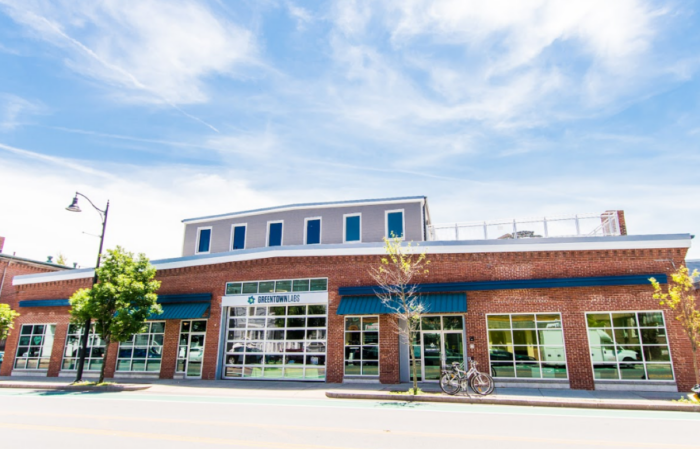What surprised me most at Greentown Labs’ 2023 Climate Tech Summit last year? That evening, on the bust back to New Hampshire, I opened my brown-bag Indian food leftovers from the night before to find…someone else’s half-eaten, microwavable, Market Basket meatball marinara.
In a roundabout way, the mixup marks a good conference. So intent was I on my conversation (about Viking burial grounds, Swedish railways, and siting considerations for big climate tech plants) that, in my last-minute race to catch my last-minute Uber, I grabbed the brown bag lunch from the middle shelf of the GTL refrigerator without stopping to remember that GTL had, in fact, TWO different refrigerators…and my Momo N Curry leftovers were, sadly for me and the person whose lunch I stole, in the other one.
What did I learn,beyond the difference between momos and microwavable meatballs? Here are some highlights:
- Boston aspires to be a global center of climate innovation.
With both Somerville mayor Katjana Ballantyne and Massachusetts governor Maura Healey giving speeches, it’s no surprise that the lecture portion of the event sung Greater Boston’s praises. What did surprise me was the tune of the song. Speakers didn’t see the competition as the New York, the Northeast, or even the entire US (Yankees-Red Sox rivalries aside). Instead, they saw the city and state competing for projects with the rest of the world. And they seemed to see it as a zero-sum game.
When it comes to offshore wind, for example, “companies are either going to come to Massachusetts or they are going to Europe or elsewhere,” said Healey. “I want to win that competition.” Now, to anyone familiar with the Bostonian view of the world, this stance may be about as surprising as a snail-paced Green line. But it rekindled in me the curiosity I’d had since the Inflation Reduction Act passed: what incentives encourage the relocation of a project that would have been built anyway (for example, from the North Sea to the Vineyard Sound), and what incentives encourage something to happen that otherwise wouldn’t be built at all? And which route has the greater a) climate and b) economic impact?
Now, I’m all for Boston. I’ll likely end up here, if I don’t jump ship for a country where my foreign language skills can gather slightly less rust. So the more climate tech in the area, the better, so far as my personal life is concerned. But as someone interested in the overall fate of humans on this planet, I want to know: how do we design incentives to be magnifying glasses, not lightning rods? (If you have ideas, or if you disagree with the rationale behind the question, please let me know – I’d love to chat.) 🧠
- Finding corporate partners sounds like college dating.
One of the panel discussions I found fascinating featured people from startups and large corporations who had worked on startup-corporate partnerships. With clients in such positions, I appreciated the chance to learn more about a topic relatively new to me. My most succinct summary? It argued both sides should start small, take things one step at a time, and find ways to test the potential partner’s level of interest and commitment – while keeping in mind all the while that the potential long-term partner is likely seeing other parties as well.
Basically: dating, but with Linkedin and conferences instead of Hinge and frat basements as the medium of choice.
- Traversing the “Second Valley of Death” rests on talent
One of the day’s most excitingly titled panels, “Traversing the Second Valley of Death,” panel emphasizes that a common peril in scaling an innovation commercially lies within workforce needs. The skills most helpful in kick starting a company, especially at the leadership level, are not necessarily the skills most helpful when it comes to scaling it.
To prepare for this shadow, Form Energy COO and President Ted Wiley said, companies should “go slow to go fast” – (not) coincidentally, Form Energy’s motto. Build your team deliberately, the panel advised, keeping in mind that you’ll likely need to shift from a development to a deployment company quickly.
My own question that I wrote in my notes but didn’t ask: should companies hire people who would excel at that transition period, even if their skill set is then less optimized for either development or deployment? Do any companies find success hiring people who excel at one phase specifically, with the present understanding that they move to another opportunity when the company shifts stages? What other approaches work?
I had a great conversation with Victoria Pisini on why it’s so important to lay the groundwork for the commercialization transition ahead of time and why it often makes sense to bring in someone expert at that pivotal stage to help everyone align on what’s important. If I had taken better notes, I could have outlined more specifics here…this way, if you’re curious, you’ll have to talk to Victoria. 🕵️
Overall, the day offered a bright spot in my week that made up for the loss of my momos. And my decision to bring along my half-knitted scarf turned out to be a great investment not only in my attention span but in starting conversations. (Though I still, unfortunately, did not finish it in time for the holidays…) 🧶
Thanks for a great event, Greentown Labs – you’ll definitely see me back this year! (Maybe, just maybe I will have finished knitting my scarf by then.)



